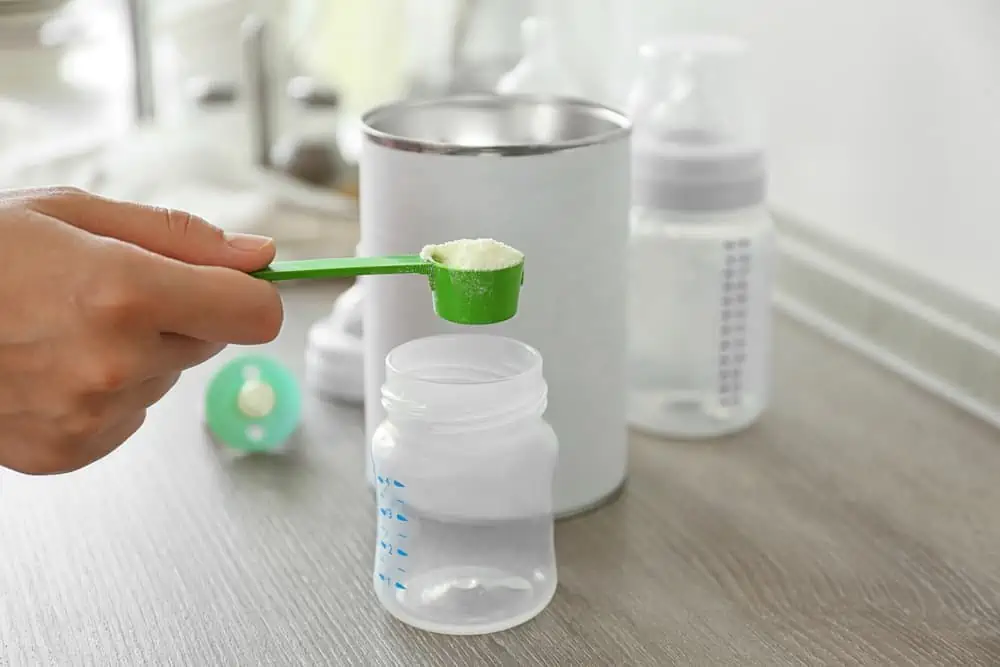How to Tell if Baby Formula Is Upsetting the Stomach
- Last Updated: July 27th, 2023

Attorney Jessica Paluch-Hoerman, founder of TruLaw, has over 28 years of experience as a personal injury and mass tort attorney, and previously worked as an international tax attorney at Deloitte. Jessie collaborates with attorneys nationwide — enabling her to share reliable, up-to-date legal information with our readers.
Legally Reviewed
This article has been written and reviewed for legal accuracy and clarity by the team of writers and legal experts at TruLaw and is as accurate as possible. This content should not be taken as legal advice from an attorney. If you would like to learn more about our owner and experienced injury lawyer, Jessie Paluch, you can do so here.
Fact-Checked
TruLaw does everything possible to make sure the information in this article is up to date and accurate. If you need specific legal advice about your case, contact us by using the chat on the bottom of this page. This article should not be taken as advice from an attorney.
How to Tell if Baby Formula Is Upsetting the Stomach
Sometimes, newborns who receive baby formula can experience an upset stomach, diarrhea, or gas.
If this occurs, it might be due to a dairy or soy allergy.
The symptoms will usually go away if you switch formulas and the infant is no longer being exposed to the allergen.

In rare cases, premature infants develop serious symptoms associated with NEC (necrotizing enterocolitis) after receiving cow’s milk-based baby formula such as Similac or Enfamil.
Preterm babies are more likely to contract NEC when receiving bovine milk formula than they are when subsisting exclusively on human breast milk.
Table of Contents
Common Infant Formula Side Effects
An upset stomach is one of the common side effects of using baby formula.
If an infant is allergic to dairy and receives cow’s milk-based infant formula, they might show symptoms of an upset tummy.
An upset stomach can also occur if infant formula is contaminated by bacteria like salmonella.
The FDA recently recalled Similac (one of the popular bovine-milk-based baby formulas that has been shown to cause higher levels of NEC in preterm infants) after finding that some products were contaminated with Cronobacter bacteria, which can lead to life-threatening conditions, such as sepsis.
Some of the classic signs of an upset stomach after receiving formula include spitting up after feeding, vomiting after feeding, excessive flatulence, and crying or fussing.
If an upset stomach is caused by an allergy to cow’s milk, the infant may develop other symptoms of an allergic reaction.
In addition to stomach issues, they might develop skin rashes and a stuffy nose.
Baby formula that does not contain the proper nutrition can also harm the infant receiving it.
Baby formula products must abide by strict guidelines set by the FDA to ensure that babies receive all the nutrients they need from formula products.
This is why the CDC encourages parents to avoid homemade infant formula as well as imported formula products that are not subject to FDA regulations.
Severe Side Effects of Baby Formula
Some babies experience a severe allergic reaction to bovine milk-based baby formulas.
Depending on the severity of the allergy, consuming dairy could cause swelling in the mouth and throat, hives, and vomiting.
Severe allergic reactions often require immediate emergency care.
Not all allergic reactions show up right away.
It may be days or weeks after an infant begins receiving cow’s-milk-based formula before they show symptoms of a dairy allergy.
NEC is another serious side effect of cow’s-milk-based formula products although it tends to primarily occur in premature infants, especially those who were born weighing less than two pounds.
NEC rarely occurs in full-term babies, but about 1 in 1,000 premature babies suffers from the disease.
What Is NEC?
NEC is a gastrointestinal disease that can cause life-threatening complications.
As bacteria from infant formula builds up in an infant’s intestinal tract, it can begin to erode the intestinal wall.
Eventually, this can lead to perforations, or holes in the intestinal lining.
When holes form in the intestinal wall, bacteria are then allowed to seep out of the intestines and into the abdominal cavity, potentially infecting other organs.
It can also leak into the bloodstream, which would cause the bacteria to circulate throughout the infant’s body.
 Other common symptoms of NEC include green and yellow vomit, abdominal pain and swelling, bloody stools, diarrhea, lethargy, lack of appetite, and an inability to gain weight.
Other common symptoms of NEC include green and yellow vomit, abdominal pain and swelling, bloody stools, diarrhea, lethargy, lack of appetite, and an inability to gain weight.
NEC can occur in the small intestine, the large intestine, or both.
Some of the complications that can arise from NEC include sepsis, intestinal strictures, and short bowel syndrome.
Sepsis is a severe blood infection that is typically caused by bacterial infections.
Intestinal strictures occur when the intestinal tract narrows, which can prevent food from freely passing through an infant’s bowel.
Strictures are quite common in young infants who contract NEC, though they typically don’t appear until a few months after the infant has recovered from NEC.
Short bowel syndrome can occur if intestinal tissue is destroyed or damaged due to NEC.
Short bowel syndrome can lead to a condition known as malabsorption.
Malabsorption prevents the intestines from being able to properly absorb the nutrients found in food.
These nutrients are necessary for babies to develop and grow.
Infants who develop short bowel syndrome due to NEC may need care for the rest of their lives to ensure they get the proper nutrients.
Parents whose children were diagnosed with NEC after receiving products like Similac and Enfamil have filed lawsuits in numerous states against the manufacturers of these products, alleging that the manufacturers failed to disclose the potential dangers of bovine milk formula being given to premature infants.
If you feel your baby has suffered from NEC due to a liable third party, you may be eligible to file a lawsuit, but you must act quickly and file a suit before the statue of limitations expires.
TruLaw and its team of seasoned lawyers fight on behalf of individuals harmed by drugs, devices, chemicals, and other products.
To date, TruLaw and its partner law firms have successfully collected over $3 billion through verdicts and settlements in all 50 states.
Use our Instant Case Evaluator to find out if you are eligible for a Necrotizing Enterocolitis (NEC) lawsuit today.

Managing Attorney & Owner
With over 25 years of legal experience, Jessica Paluch-Hoerman is an Illinois lawyer, a CPA, and a mother of three. She spent the first decade of her career working as an international tax attorney at Deloitte.
In 2009, Jessie co-founded her own law firm with her husband – which has scaled to over 30 employees since its conception.
In 2016, Jessie founded TruLaw, which allows her to collaborate with attorneys and legal experts across the United States on a daily basis. This hypervaluable network of experts is what enables her to share the most reliable, accurate, and up-to-date legal information with our readers!
Here, at TruLaw, we’re committed to helping victims get the justice they deserve.
Alongside our partner law firms, we have successfully collected over $3 Billion in verdicts and settlements on behalf of injured individuals.
Would you like our help?
At TruLaw, we fiercely combat corporations that endanger individuals’ well-being. If you’ve suffered injuries and believe these well-funded entities should be held accountable, we’re here for you.
With TruLaw, you gain access to successful and seasoned lawyers who maximize your chances of success. Our lawyers invest in you—they do not receive a dime until your lawsuit reaches a successful resolution!
AFFF Lawsuit claims are being filed against manufacturers of aqueous film-forming foam (AFFF), commonly used in firefighting.
Claims allege that companies such as 3M, DuPont, and Tyco Fire Products failed to adequately warn users about the potential dangers of AFFF exposure — including increased risks of various cancers and diseases.
Depo Provera Lawsuit claims are being filed by individuals who allege they developed meningioma (a type of brain tumor) after receiving Depo-Provera birth control injections.
A 2024 study found that women using Depo-Provera for at least 1 year are five times more likely to develop meningioma brain tumors compared to those not using the drug.
Suboxone Tooth Decay Lawsuit claims are being filed against Indivior, the manufacturer of Suboxone, a medication used to treat opioid addiction.
Claims allege that Indivior failed to adequately warn users about the potential dangers of severe tooth decay and dental injuries associated with Suboxone’s sublingual film version.
Social Media Harm Lawsuits are being filed against social media companies for allegedly causing mental health issues in children and teens.
Claims allege that companies like Meta, Google, ByteDance, and Snap designed addictive platforms that led to anxiety, depression, and other mental health issues without adequately warning users or parents.
Transvaginal Mesh Lawsuits are being filed against manufacturers of transvaginal mesh products used to treat pelvic organ prolapse (POP) and stress urinary incontinence (SUI).
Claims allege that companies like Ethicon, C.R. Bard, and Boston Scientific failed to adequately warn about potential dangers — including erosion, pain, and infection.
Bair Hugger Warming Blanket Lawsuits involve claims against 3M — alleging their surgical warming blankets caused severe infections and complications (particularly in hip and knee replacement surgeries).
Plaintiffs claim 3M failed to warn about potential risks — despite knowing about increased risk of deep joint infections since 2011.
Baby Formula NEC Lawsuit claims are being filed against manufacturers of cow’s milk-based baby formula products.
Claims allege that companies like Abbott Laboratories (Similac) and Mead Johnson & Company (Enfamil) failed to warn about the increased risk of necrotizing enterocolitis (NEC) in premature infants.
Here, at TruLaw, we’re committed to helping victims get the justice they deserve.
Alongside our partner law firms, we have successfully collected over $3 Billion in verdicts and settlements on behalf of injured individuals.
Would you like our help?








